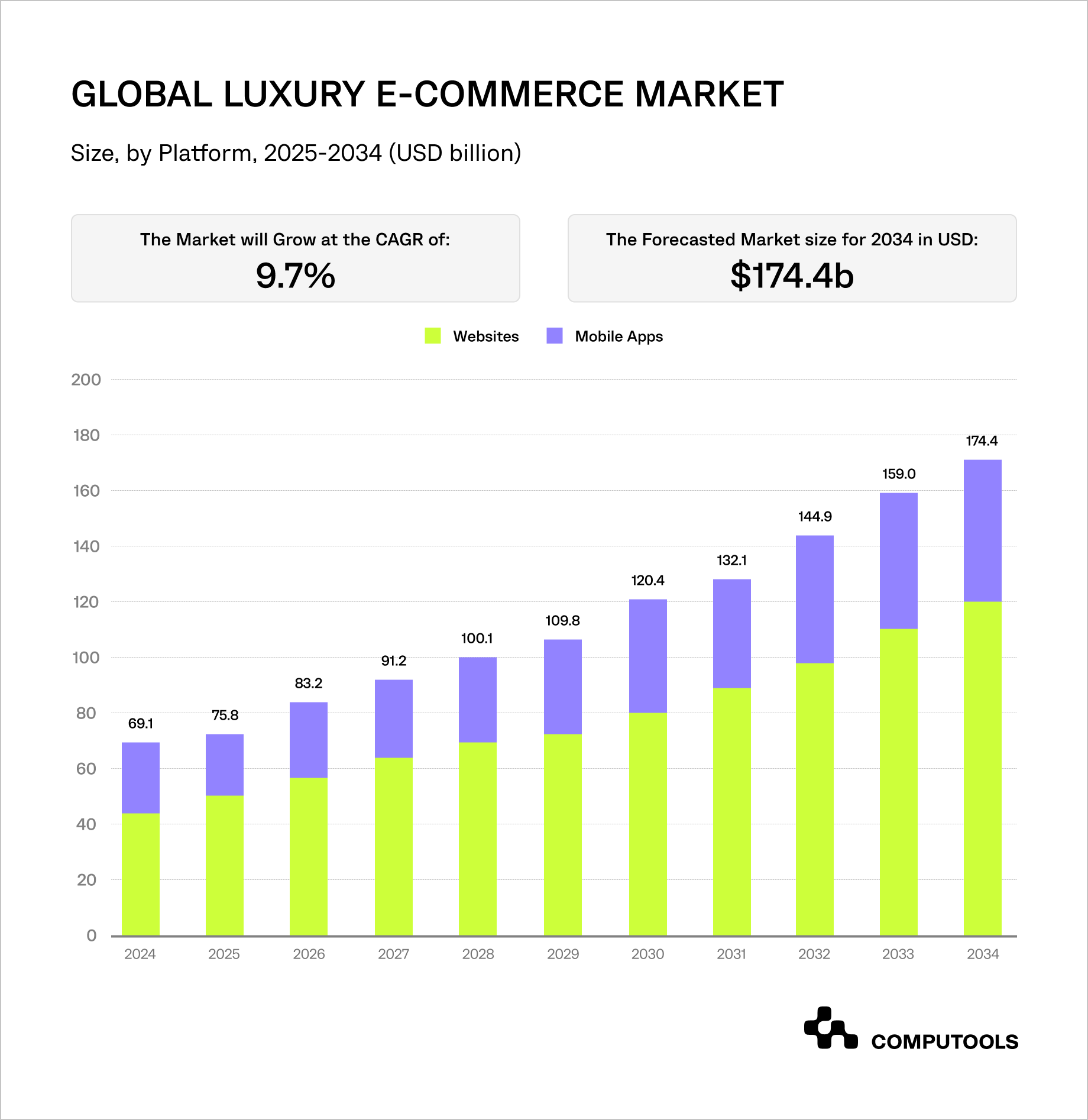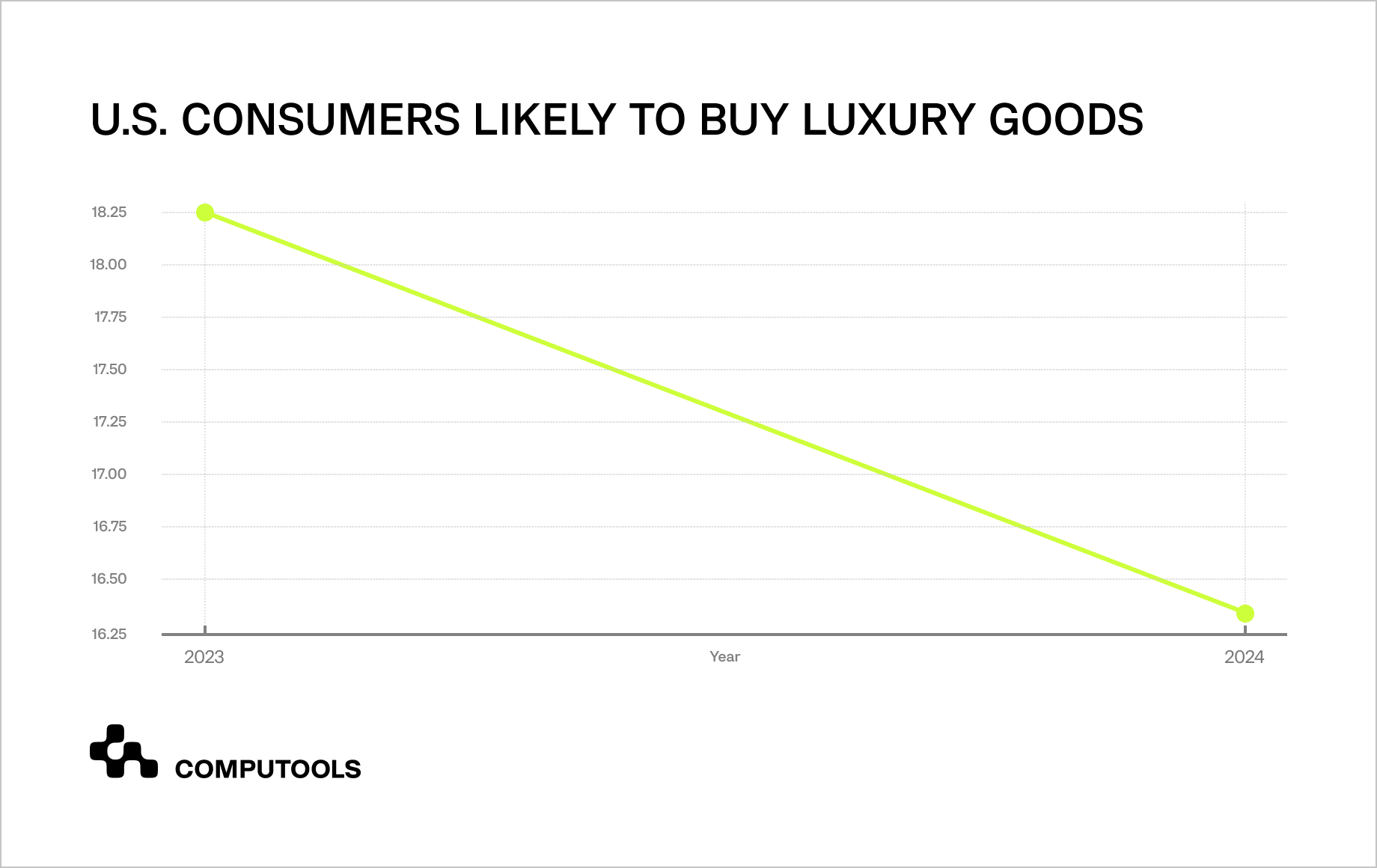In the world of luxury and high-end retail, where the buyer expects not just to “buy a product”, but to experience the brand, the atmosphere and exclusivity, the standard solution for e-commerce often turns out to be insufficient.
Luxury buyers demand a flawless experience – personalized, fast and emotional, where every detail corresponds to the brand values. For companies operating in this segment, this means: the digital presence should not be just a showcase, but an extension of the brand philosophy.
The growth of luxury e-commerce is confirmed by the numbers: according to Market.us, the luxury online sales market is estimated at $69.1 billion in 2024 and could reach $174.4 billion by 2034, demonstrating a stable annual growth of about 9.7% CAGR.

At the same time, according to Amra & Elma LLC, the online channel already covers more than 20% of the global luxury market, and this share continues to grow rapidly.
This means that premium brands are moving from traditional boutiques to digital ecosystems that must support flexible architecture, impeccable UX and deep personalization.

If you manage an enterprise retail division or are responsible for the technology platform of a luxury brand, the issue of building a custom ecommerce CMS becomes strategic. After all, ready-made solutions like Magento or Shopify “out of the box” limit the individuality, scalability and speed of updates required for the luxury segment. That is why more and more companies are switching to enterprise CMS development for eCommerce, solutions that combine custom architecture, flexible integrations and process automation.
Computools, with many years of subject matter expertise in creating enterprise platforms for retail, has confirmed the effectiveness of this approach through real-world projects, delivering 20+ successful custom software solutions for retail businesses.
For the global brand Dior, we developed a custom ecommerce CMS that unified data from various sources into a single system, provided a personalized experience for customers, and gave the team the ability to quickly manage content and campaigns in dozens of countries.
Based on this case, we have prepared a detailed guide, a step-by-step instruction on how to build your own luxury retail digital experience platform with a modern architecture that will scale with your business.

Inside the architecture of luxury: how Computools built a custom eCommerce CMS for Dior
Creating a custom ecommerce CMS for a luxury brand is not just about developing a website, but building a holistic ecosystem that combines technology, emotions, and business logic.
The Dior Data Hub case, implemented by the Computools team, illustrates this approach well: the CMS architecture here not only supports luxury eCommerce platform development, but also creates a flawless user experience, where each element works for brand recognition and stability.
1. Defining requirements and business goals
The luxury segment lives by its own rules: everything here must be perfect — both the product and the technology. Therefore, the first stage is a clear formulation of goals.
For Dior, personalization, omnichannel, and speed of interaction were the main priorities. We created personalized shopping experiences with custom CMS, combining customer data with CDP modules to ensure an individual buyer’s journey. The system supports sales simultaneously in different formats — from flagship boutiques to pop-up platforms, ensuring the same quality of service in each channel.
Special attention is paid to UX/UI — every detail, from typography to animations, should convey the emotion of the brand. And, of course, security and scalability: cloud infrastructure with autoscaling and GDPR compliance guarantee stability even during peak collection releases.
2. CMS architecture selection
Classic monoliths cannot keep up with the pace of the luxury industry. That is why headless and hybrid CMS architecture have become the standard for enterprise solutions.
In the Dior project, we used a hybrid model: the CMS core manages the content, and the headless API layer is responsible for the frontend. This approach allows to update the interface without interfering with the backend, supports PWA applications, in-store displays, AR/VR elements.
All this not only speeds up the system, but also creates a flexible basis for fashion and apparel software development, where technology becomes an extension of the brand’s aesthetics.
3. Architecture and key components
At the heart of the solution is a modular software architecture that combines a CMS core, PIM/DAM for product and media management, an eCommerce engine with dynamic pricing, and a flexible API infrastructure.
Data from ERP, CRM, BI platforms, and AI modules are collected in a single space, this is what forms CMS integration for luxury retail platforms.
For Dior Data Hub, such an architecture allowed us to reduce the time to launch new collections from several weeks to several days. Computools applied a similar approach to Reenox project, proving the effectiveness of a centralized CMS in multi-channel environments.
4. Phased development
The CMS building process consists of sequential phases — from business analysis and architectural modeling to DevOps integration and post-launch optimization.
We develop a core with an administration panel, synchronize PIM/DAM, add AI recommendations, AR visualizations, ensure containerization and CI/CD fluency.
Thanks to this, Dior managed to significantly reduce the time-to-market of new collections, while maintaining stability even under the load of holiday campaigns.
5. Architecture principles
We adhere to several basic principles: scalability, modularity, seamless integration and omnichannel access. Content should work equally well on the web, mobile application and be ready for augmented reality.
Personalized shopping experiences are based on AI analytics, while enterprise content management for online stores provides full integration with ERP, CRM, BI and CDP systems. UX/UI in the luxury segment is not about functionality, but about emotion – trust, inspiration, a sense of uniqueness.
Retail challenges and business benefits of a custom eCommerce CMS
| Retail Challenges | How a Custom CMS Addresses Them | Business Benefits |
| Fragmented data from multiple sales channels | Centralized analytics hub that unifies CRM, ERP, warehouse, and marketplace data. | Real-time visibility into sales and inventory; faster and more accurate decision-making. |
| Manual catalog and content updates | Headless CMS integrated with PIM/DAM automates localization, content validation, and synchronization. | Up to 40% faster time-to-market for new collections; consistent quality across regions. |
| Slow reaction to market demand | Built-in behavioral analytics, heatmaps, AI-driven segmentation, and recommendation engines. | Optimized stock levels, 20% fewer overstock losses, and higher personalization accuracy. |
| Complex logistics and delivery tracking | Full integration with WMS and logistics providers in real time. | Transparent supply chain, accurate delivery times, and improved customer trust. |
| Inconsistent branding across regional websites | Centralized CMS control of localization, design templates, and tone of voice. | Unified brand identity and coherent visual experience across all markets. |
| Outdated mobile experience | PWA-based optimization, adaptive UX, and seamless one-click checkout. | Up to +35% growth in mobile conversions and higher user retention. |

Explore how a purpose-built enterprise CMS elevates e-commerce with precision control, brand consistency, and frictionless content operations.
Essential CMS features for luxury eCommerce: insights and real-world case studies
In the luxury eCommerce segment, the platform must not only support sales, but also create a digital brand space, a place where technology works on emotions. That is why custom CMS for premium retailers combines personalization, AR/VR visualization, adaptive content and full integration with ERP, CRM and logistics systems. This provides instant response to user actions, seamless experience and global reach without losing exclusivity.
A prime example is Burberry, which switched to a headless CMS from Contentstack to speed up content updates in international markets and increase the flexibility of brand campaigns. The company reduced content localization time by almost 80% and minimized technical requests from marketing teams, leaving the focus on creativity and storytelling.
Luxury doesn’t always mean scale: British brand Beara Beara used a headless commerce architecture based on React Bricks and Swell to give its team the ability to manage content independently, without developers, while maintaining the impeccable aesthetics of an online boutique.
And the Hermès case shows how digital can maintain an aura of exclusivity. During the redesign of its eCommerce platform, the brand rethought UX as part of a “brand touch ritual” — minimalism, speed, elegance of each click became an extension of the maison’s philosophy.
Together, these examples demonstrate: a modern luxury CMS is not just a content management tool, but a way to support a brand identity in a digital world where premiumness is measured not only by product quality, but also by user experience.
How to choose a developer for custom eCommerce CMS in retail & enterprise
Choosing the right development partner for your custom content management system for eCommerce is critical, especially in the context of CMS solutions for high-end retail.
Focus on companies with deep expertise of software architecture development, a track record of delivering scalable, secure platforms, and the ability to align tech solutions with luxury brand expectations.
Strong portfolios in enterprise integrations (PIM, DAM, ERP, CRM), omnichannel experience, and support for global markets are key indicators. Make sure the team offers modular software architecture that supports future expansion without disrupting the core.
A solid provider will also bring full-cycle web development services and proactive DevOps support.
Finally, look for verified client reviews on platforms like Clutch, especially from businesses with similar projects in the retail or luxury industry.
Computools, with its proven expertise in retail software development services, offers exactly this level of delivery backed by real-world cases like Dior.
Why leading brands trust Computools
At Computools, we go beyond development, we become a long-term technology partner, helping companies transform their vision into scalable, high-impact digital products.
Take LineSale, a US-based eCommerce company, as an example. Facing performance bottlenecks and fragmented IT infrastructure, they turned to Computools to re-architect their platform from the ground up. The result? A 67% increase in revenue, a 112% boost in user throughput, and a streamlined checkout experience, all delivered through close collaboration and agile development.
Or consider GoneTrippin, a travel tech startup with a bold idea: connect travelers and small businesses through a blockchain-powered app. Computools helped them bring the concept to life (from MVP strategy to full implementation) enabling secure transactions, reduced fees, and a vastly expanded monetization model.
Whether it’s eCommerce or travel, early-stage or enterprise, we bring deep domain knowledge, clear communication, and design thinking that moves business forward.
Conclusion
Luxury eCommerce is no longer defined by the storefront, it’s defined by the story, the feeling, and the precision behind every digital touchpoint. A custom enterprise CMS transforms these elements into a living ecosystem, where design and data merge to create experiences that feel effortless yet deeply personal.
From Dior’s digital architecture to Burberry’s headless agility, from the boutique craftsmanship of Beara Beara to Hermès’s refined minimalism, the message is clear: technology in the luxury world must be invisible, but its impact undeniable.
A well-crafted CMS doesn’t just manage content; it orchestrates emotion. It ensures that every product page, animation, and checkout carries the brand’s DNA, its rhythm, tone, and grace.
Building such a platform is not about adding features; it’s about preserving identity through innovation. Because in the realm of luxury, perfection is not an option, it’s the standard. And when technology fades into the background, the brand itself becomes the experience.
Computools
Software Solutions
Computools is an IT consulting and software development company that delivers innovative solutions to help businesses unlock tomorrow.









“Computools was selected through an RFP process. They were shortlisted and selected from between 5 other suppliers. Computools has worked thoroughly and timely to solve all security issues and launch as agreed. Their expertise is impressive.”